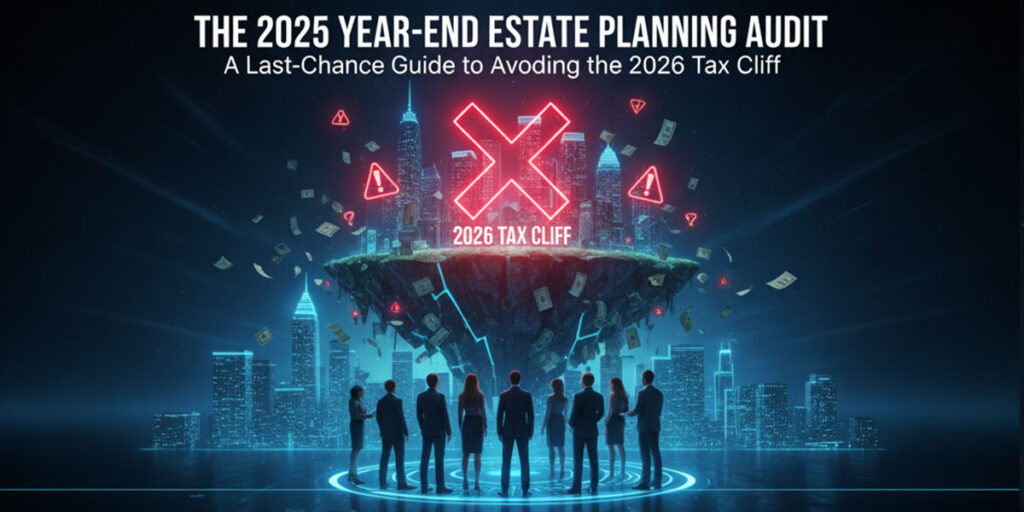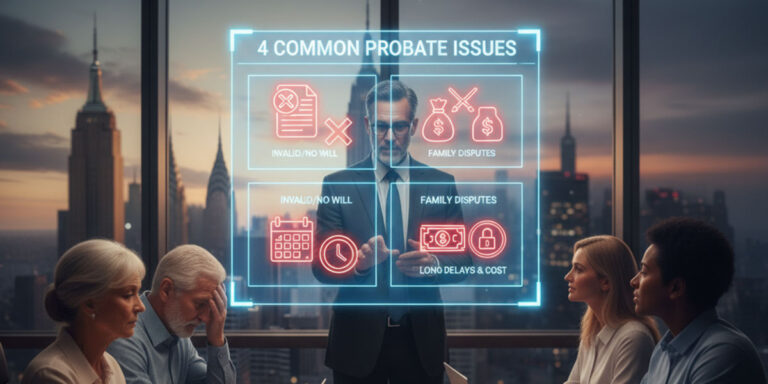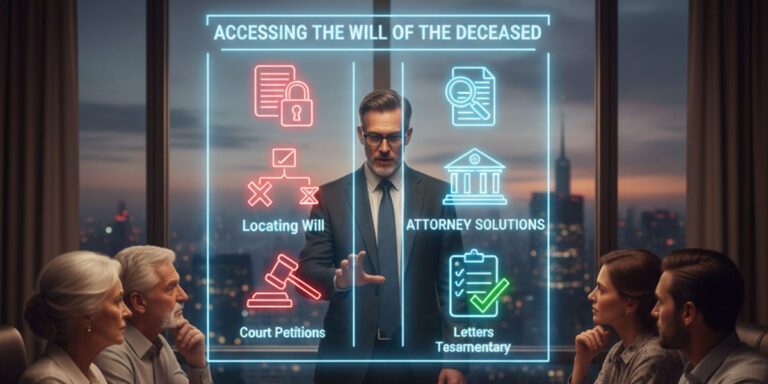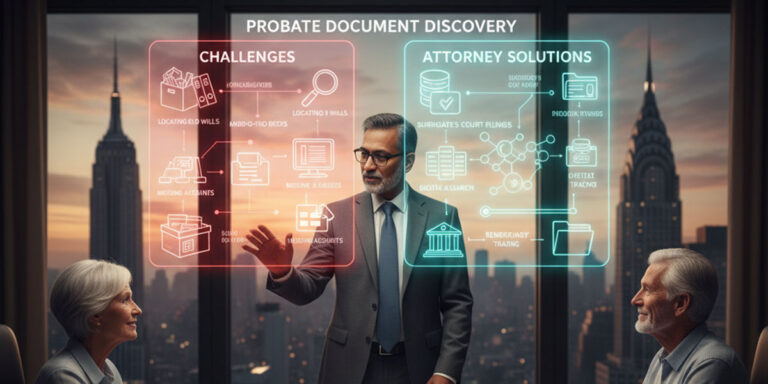Your Last-Chance 2025 Estate Plan Audit
For more than 30 years as a New York estate planning attorney, I have emphasized that a great estate plan is not a static document, but a living strategy that must adapt to changes in the law and in life. Never has that advice been more urgent than it is right now, at the close of 2025. We are standing at the edge of a legislated, predictable financial cliff, and the window to prepare is just months away from closing forever. This is not a political prediction; it is a scheduled change in the law.
On January 1, 2026, the historically high federal estate tax exemption, a temporary gift from the Tax Cuts and Jobs Act of 2017 (TCJA), is set to expire. It will be cut in half. For many New York families, this “sunset” provision will mean the sudden appearance of a 40% federal estate tax on their legacy. The time for procrastination is over. The end of 2025 is the absolute last chance to take advantage of the most favorable wealth transfer laws of our lifetime.
At Morgan Legal Group, we have shifted our focus to conducting urgent, comprehensive “Year-End Estate Planning Audits” for our clients. This guide is a blueprint for that audit. We will walk you through the critical areas of your plan that must be reviewed and potentially overhauled before the clock strikes midnight on December 31st. This is your last chance to avoid the costly mistakes of inaction. To begin your audit, contact our firm immediately.
Part 1: The Looming Deadline – Understanding the 2026 Tax Cliff
To grasp the urgency, you must understand the numbers. The TCJA temporarily doubled the federal gift and estate tax exemption. For 2025, this allows an individual to transfer an unprecedented **$13.61 million** during their life or at death without paying any federal gift or estate tax. For a married couple, that amount is over **$27 million**. This has made federal estate tax a non-issue for a vast number of people. This all changes in 2026.
The “Sunset”: A Return to Reality
On January 1, 2026, the exemption amount will revert to its pre-2018 level, adjusted for inflation. This is projected to be approximately **$7 million** per person. While still a significant number, it will pull millions of families, especially those in high-cost-of-living areas like New York with valuable real estate and investment portfolios, back into the crosshairs of a 40% federal tax.
A Scenario: The Cost of Inaction
A couple in Westchester has a combined estate of $20 million.
- If they die in 2025: Their estate is well below the $27.22 million exemption. They owe $0 in federal estate tax.
- If they die in 2026: The exemption drops to approximately $14 million. Their $20 million estate is now $6 million over the threshold, creating a potential federal estate tax bill of approximately **$2.4 million** (40% of $6 million).
This is the cliff. The good news is, for those who act in 2025, there is a powerful and legal way to avoid this outcome.
Part 2: The Audit – Area 1: Your Gifting Strategy (“Use It or Lose It”)
The most urgent part of your 2025 audit is your gifting strategy. The IRS has confirmed with “anti-clawback” regulations that large, tax-free gifts made using the current high exemption before the end of 2025 will not be penalized after the exemption drops. This creates a powerful, but time-sensitive, “use it or lose it” opportunity.
Audit Point A: Have You Maximized Your Lifetime Exemption?
The core strategy for high-net-worth individuals is to make a large gift to an irrevocable trust before December 31, 2025. By doing this, you use up your high exemption now, permanently removing those assets (and all their future growth) from your taxable estate, even after the exemption amount decreases.
The Spousal Lifetime Access Trust (SLAT): The Premier 2025 Tool
A SLAT is the most popular and powerful tool for this strategy. One spouse makes a large gift to a trust for the benefit of the other spouse. This uses the gifting spouse’s high exemption, but because the other spouse is the beneficiary, the family retains indirect access to the funds if needed. It is a way to “have your cake and eat it too”—removing assets from your estate while keeping them accessible within the family unit. An expert attorney like Russel Morgan is essential for this complex technique.
Audit Point B: Are You Utilizing Your Annual Exclusion?
Separate from the large lifetime exemption, you can also gift a certain amount (the “annual exclusion,” $18,000 in 2024, projected higher for 2025) to as many individuals as you wish each year, gift-tax-free. For a couple with three children and six grandchildren, this allows them to transfer over $300,000 per year out of their estate without using any of their lifetime exemption.
Part 3: The Audit – Area 2: Your Trust Structure
Your 2025 audit must scrutinize your existing trust documents. A trust drafted in the high-exemption era of the TCJA is likely ill-prepared for the tax reality of 2026.
Audit Point A: Does Your Plan Rely on Portability?
Many plans for married couples drafted since 2018 have relied on “portability”—the ability for a surviving spouse to use the deceased spouse’s unused exemption. While simple, portability is often an inefficient strategy, and it is completely unrecognized by New York State’s separate estate tax.
The 2026 Solution: The Return of the Bypass Trust. Your trust should be audited to see if it includes provisions for a Bypass Trust (or Credit Shelter Trust). This trust is created at the first spouse’s death to hold and protect their exemption amount. The assets “bypass” the surviving spouse’s estate, shielding them and all their future growth from being taxed at the second death. This is a more robust strategy than portability for navigating both NYS and federal estate tax.
Audit Point B: Does Your Trust Protect Your Heirs?
A simple trust that distributes assets outright to your children is a missed opportunity. A modern, sophisticated trust should be audited to ensure it contains provisions to create lifetime asset protection trusts for your beneficiaries, shielding their inheritance from their potential divorces, creditors, and lawsuits. This is a core part of our wills and trusts services.
Audit Point C: Is Your Trust Properly Funded?
An unfunded trust is a useless trust. Your year-end audit must include a review of your asset titling. Is your home in Brooklyn titled in the name of your trust? Are your brokerage accounts? If not, the trust is an empty shell that will not avoid probate. The end of the year is the perfect time to correct this critical mistake.
Part 4: The Audit – Area 3: Your Incapacity and Elder Law Plan
An audit focused solely on tax is incomplete. A true audit is a stress test of your entire plan. What happens if you become incapacitated before you can implement these urgent tax-planning moves?
Audit Point A: Is Your Power of Attorney Modern and Robust?
Your Durable Power of Attorney is your primary defense against a court-ordered guardianship. Your audit should confirm:
- Your named agents are still the right people.
- It includes a Statutory Gifts Rider, which may be essential for your attorney to implement last-minute tax planning or elder law planning on your behalf.
- It contains modern language to address digital assets.
Audit Point B: Have You Addressed Long-Term Care Costs?
The cost of nursing home care on Long Island and in the metro area can exceed $200,000 per year. An estate plan that ignores this risk is not a complete plan. Your 2025 audit is the time to consider advanced strategies like a Medicaid Asset Protection Trust, which can shield your assets but must be implemented five years before care is needed.
Part 5: The Audit – Area 4: Your Beneficiary Designations
This is a simple but critical audit point. Your beneficiary designations on your life insurance and retirement accounts override your will. An outdated form can lead to disaster.
Audit Point A: Are Your Beneficiaries Correct?
Your 2025 audit must include a full review of every beneficiary form. Have you removed ex-spouses? Have you named contingent beneficiaries? Have you addressed what happens if a child predeceases you? A mistake here can accidentally disinherit your grandchildren.
Conclusion: Your Last, Best Chance to Act
The end of 2025 is not just another holiday season. It is a firm, legislated deadline that will reshape the world of estate planning. The “Great Exemption” of the past several years is coming to an end, and the cost of inaction will be measured in the millions of dollars for many New York families. This Year-End Estate Planning Audit is your last chance to get ahead of these changes, to leverage the opportunities that are about to disappear, and to fortify your plan against the challenges of 2026 and beyond.
Do not let this window of opportunity close. Do not let procrastination define your legacy. The time to act is now. Contact Morgan Legal Group today to schedule your urgent 2025 Year-End Estate Planning Audit. Let us help you secure your family’s future before it is too late.
For official information regarding the federal estate and gift tax, you can visit the resources provided by the Internal Revenue Service (IRS).





